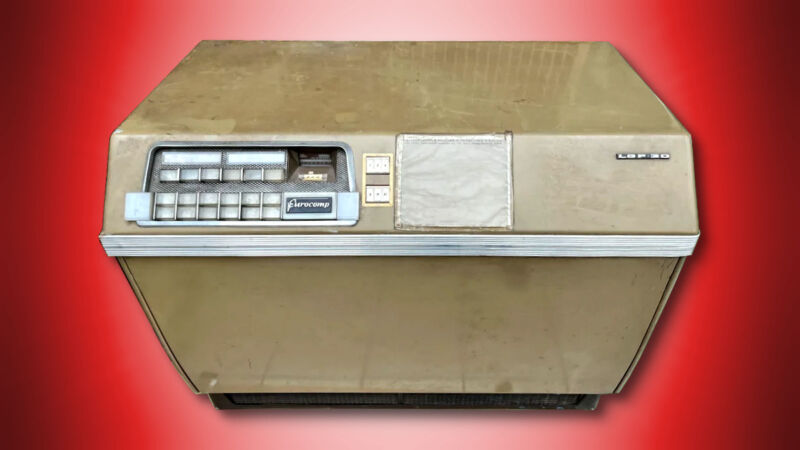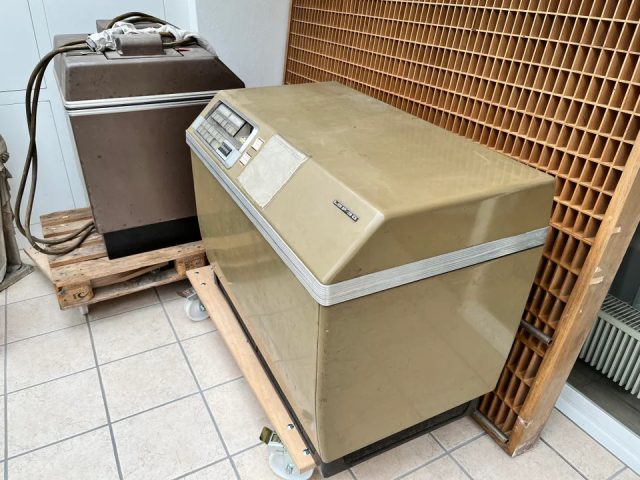

Redditor discovers legendary 1956 computer in grandparents’ basement
source link: https://arstechnica.com/information-technology/2022/11/redditor-discovers-legendary-1956-computer-in-grandparents-basement/
Go to the source link to view the article. You can view the picture content, updated content and better typesetting reading experience. If the link is broken, please click the button below to view the snapshot at that time.
lost treasures of german computing —
Redditor discovers legendary 1956 computer in grandparents’ basement
The 1956 LGP-30 computer, subject of hacker lore, is one of only 45 made in Europe.
Benj Edwards - 11/8/2022, 11:02 PM

On Monday, a German Redditor named c-wizz announced that they had found a very rare 66-year-old Librascope LGP-30 computer (and several 1970 DEC PDP-8/e computers) in their grandparents' basement. The LGP-30, first released in 1956, is one of only 45 manufactured in Europe and may be best known as the computer used by "Mel" in a famous piece of hacker lore.
Developed by Stan Frankel at California Institute of Technology in 1954, the LGP-30 (short for "Librascope General Purpose 30") originally retailed for $47,000 (about $512,866 today, adjusted for inflation) and weighed in at 800 pounds. Even so, people considered it a small computer at the time due to its desk-like size (about 44×33×26 inches). According to Masswerk.at, the LGP-30 included 113 vacuum tubes, 1,450 solid-state diodes, and rotating magnetic drum memory—a 6.5-inch-diameter and 7-inch-long tube rotating at 3,700 RPM—that could store 4,069 31-bit words (equivalent to about 15.8 modern kilobytes).
Along with the main LGP-30 unit, c-wizz found a Flexowriter typewriter-style console (used for input and output with the machine) and what looks like a paper tape reader for external data storage. A few PDP-8/e machines and some related equipment lurked nearby. "There seem to be more modules belonging to the PDP/8E's as well," c-wizz wrote in a Reddit comment. "There is a whole 19-inch rack where all of this is supposed to be mounted in. Maybe I can find some manuals and try to put it all together."
Although the PDP-8/e machines are rare and valuable on their own, the LGP-30 arguably stands out as the most interesting part of the basement discovery because it's part of hacker legend. In the epic "The Story of Mel," first posted to a Usenet newsgroup in 1983, a Librascope programmer named Melvin Kaye has been tasked with porting a Blackjack program from the LGP-30 to another computer. The story's author, Ed Nather, is later tasked with finding a bug in the software, and along the way, he discovers Kaye's ingenious and unconventional programming tricks. Also, Edward Lorenz reportedly developed chaos theory (and the "butterfly effect") as a result of weather experiments conducted on the LGP-30.
AdvertisementSo what was this legendary machine doing in the grandparents' basement? Ars reached out to c-wizz but did not receive a response before this story's publication. In a Reddit comment, c-wizz wrote, "The only thing I know is that my grandfather used it for some civil engineering calculations in the 60s and that he was one of only a handful of people in the country that privately owned such a computer."
Whatever the grandparent used the LGP-30 for, it appears there might be a relationship between it and the PDP-8/e units found nearby. In another comment, c-wizz wrote, "There seem to be some instructions on how to transfer code written for the LGP-30 to the PDP8\e."
After sitting in a basement for decades, the LGP-30 will likely need significant work to get running again. That's where a qualified computer museum might come in, and c-wizz appears to be looking into it. "It would truly be awesome if someone can get this thing operational again," c-wizz wrote. "I found a museum in Germany (where I'm from) that apparently has a working LGP-30. I think I'll reach out to them."
Recommend
About Joyk
Aggregate valuable and interesting links.
Joyk means Joy of geeK
